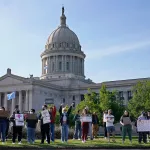The day after the Supreme Court leak, Andrea Gallegos had already started to cancel patients’ appointments.
A draft opinion that would overturn Roe v. Wade, the 1973 decision that guaranteed access to abortion, had been published online and verified by the court. In the aftermath, Gallegos, the administrator for Tulsa Women’s Clinic, an Oklahoma-based abortion provider, wasn’t worried about Roe — at least, it wasn’t the first thing she was worried about. To her, there was a bigger, more immediate threat: a six-week abortion ban the Republican governor was expected to sign any day now. The law, a direct copycat of a prohibition currently in effect in Texas, was expected to survive legal challenges. It would take effect immediately.
Tuesday morning came and went. The governor hadn’t signed. Maybe, Gallegos thought, they had more time. A few more patients could get abortions. So she added a few back on the schedule for the next day — patients who were beyond six weeks pregnant, who soon might no longer be able to get an abortion in Oklahoma.
That same evening, to little fanfare, Gov. Kevin Stitt signed into law the six-week abortion ban. The state Supreme Court declined to block the ban. If the clinic saw their patients Wednesday, they risked civil lawsuits with a penalty of up to $10,000.
So Gallegos did what she had dreaded. She began calling back patients who were past six weeks pregnant. The scheduled appointments would have to be canceled. If they wanted to seek an abortion, she told them, they should look somewhere else — Kansas, New Mexico or, a bit further away, Colorado.
“We knew he was going to sign it. But there was still this moment of shock,” she reflected a week later. “He really signed it. This is real.”
Oklahoma’s six-week abortion ban, Senate Bill 1503, is only the second in the nation to go into effect. Texas, the first, has had its ban in place since September 1. The impact of Oklahoma’s ban could be seismic in both Texas and Oklahoma — this past fall, Oklahoma emerged as the state that Texans seeking abortions were most likely to travel to for care. Some drove hundreds of miles, spending thousands of dollars to make the journey. Already, clinicians in Oklahoma are trying to devise strategies to help their patients get to clinics in neighboring Kansas. But there are limits to what they can do.
-
More abortion coverage from The 19th
- Abortion providers expected that Roe v. Wade could be overturned. But the leaked draft made it real.
- Oklahoma approves two laws that could immediately end all in-state abortion access
- Oklahoma was key to abortion access for Texans. Now, the state could ban the procedure entirely.
And even access at six weeks is not expected to last long. Last week’s draft leak has chilled abortion providers across the country, confirming what many had anticipated for months. Unless something dramatic shifts, the court will likely overturn Roe in a matter of weeks. When that happens, states will have the power to ban abortion entirely. And in both Oklahoma and Texas, that will happen. They are among the 13 states that have passed what are known as trigger laws — legislation crafted to ban abortion that would take effect almost right away once Roe is struck down.
For many, the draft decision put a post-Roe reality into sharp clarity. But for clinicians in Oklahoma, it illustrates something deeper: The rest of the country is imagining the end of federal abortion rights — but in Oklahoma, like in Texas, the moment is already here. And few people are paying attention.
“There’s kind of this view of these states as disposable — that there aren’t valuable people that live here,” said Kailey Voellinger, who runs the Trust Women clinic in Oklahoma City. “It feels like we’re afterthoughts.”
Since the new six-week ban took effect, neither President Joe Biden nor his press office has put out a statement about Oklahoma’s new law, despite publicly condemning similar bans passed in Texas and Idaho, and criticizing other Oklahoma bans that have not yet taken effect. (Idaho’s six-week ban has been blocked by its state Supreme Court.) The Department of Justice — which sprang into action when Texas’ six-week ban took effect — has been similarly quiet.
And in the meantime, patients keep calling the state’s four clinics for appointments.
Planned Parenthood’s two Oklahoma locations have not yet determined whether or when they will be offering abortions at all. Trust Women and Tulsa Women’s Clinic are also still providing the service. Those who are providing care are only seeing patients up to six weeks of pregnancy, but patients well beyond that are still calling to seek abortions. Many only learn about the new six-week ban on that initial phone call.
“There’s a lot of shock and disbelief from patients, reacting like ‘What do you mean I’ve got to go out of state?’ ‘That’s crazy, I can’t afford to take off work, I can’t leave my kids that long, how am I supposed to do that,’” Gallegos said.
Patients are angry, Voellinger said. “I’ve had two staff people tell me they got off the phone with a patient who was like, ‘Well, what am I supposed to do? Kill myself?’”
“People are exasperated and don’t know what to do,” she added.
In the clinics, the shift has been stark. Right up until the six-week ban took effect, appointments had been booked solid, the waiting rooms full of Texans and Oklahomans. Abortion appointments were booked two to three weeks out.
That’s changed since last week. At Planned Parenthood, it’s too soon to see what patient volume will look like. But in the days after the six-week ban took effect, the Tulsa Women’s Clinic performed abortions for eight patients, and then 10 the next day. That represented about half the people who came in for abortions, Gallegos said. The rest thought they were within six weeks of pregnancy, but learned at the clinic they were too far along. On the third day after the ban, 20 patients — two-thirds of the people who had booked an appointment — were able to actually get the abortions they had sought.
There are no more Texans coming for care. And the tight timeline of six weeks, Gallegos added, means that the patients who are coming for abortions have barely had time to think about their decisions. They’re being forced to rush, often without the luxury of even an extra day.
“It’s awful to have to tell the patients, ‘You can ultimately do what you need to do, but if you don’t do this today you don’t have the option anymore,’” she said.
The shift has been similar at Trust Women, which had, until April, been overwhelmed by patients traveling from Texas. Then last month, the looming threat of an Oklahoma abortion ban had caused the clinic to, stop offering abortions for several weeks. On April 22, with no ban yet in effect, they slowly resumed scheduling abortions — and, the following week, saw close to 50 abortion patients over three days.
Then SB 1503 was signed. Now the clinic sees maybe three patients a day. They’re sending the rest to Trust Women’s other clinic, in Wichita, Kansas. Staff are traveling there as well to help. Already, the Kansas clinic is booked solid through May.
Starting next week, Trust Women is planning to experiment with a new model, where they perform sonograms and other preliminary work for patients at the Oklahoma Clinic, and then help them drive to Kansas to pick up medication abortion pills — an extra two hours in the car. But those pills are only given to patients within their first trimester. And some patients, Voellinger acknowledged, won’t be able to get from Texas or Oklahoma all the way to Kansas.
Even before Roe will likely be overturned — a decision is expected this summer — Oklahoma could ban almost all abortions. The state legislature has still not acted on another Texas-inspired abortion ban: a bill that also relies on civil litigation but that, unlike the laws active in Oklahoma and Texas, would ban abortions starting at fertilization, with narrow exceptions. The bill has passed in Oklahoma’s House, and an amended version has passed the Senate — Oklahoma’s House needs to issue one more final approval of the amended ban before sending it to the governor’s desk. That vote has not been scheduled
If that bill passes, Tulsa Women’s Clinic, which only does abortions, and whose affiliate clinic is in Texas, would likely shut down. Trust Women and Planned Parenthood would stop providing abortions, pivoting instead to emphasize other health care services and potentially providing non-abortion support to their Kansas-based clinics.
Every day is precarious, Voellinger said.
“The vibes are pretty much just like, ‘Well, we’re here until we’re not, and that’s the best we can do.’”







